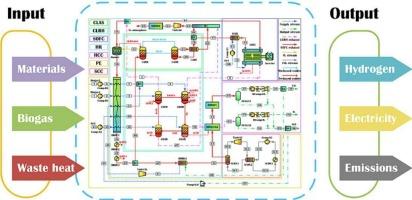Life cycle assessment of hydrogen, electricity, and heat Co-production system based on chemical looping technology and SOFC
IF 13.2
1区 工程技术
Q1 ENGINEERING, CHEMICAL
引用次数: 0
Abstract
The hydrogen industry encompasses various applications, including transportation, power generation, and energy storage, and this development trend poses higher requirements for future energy systems. It is necessary to design a hybrid system that integrates hydrogen, electricity, and heat production. To better evaluate this integration, this paper conducts a life cycle assessment of the hydrogen-electricity-heat cogeneration process based on the chemical looping technology and solid oxide fuel cell. In this study, the Gabi software is used for the modeling process. The impact assessment methods ReCiPe 2016 and IPCC are selected, including midpoint-endpoint analysis and GWP 100a analysis. The results show that by consuming biogas of 8.64E+08 kg, the electricity output and hydrogen generation are obtained as 6.58E+09 MJ and 1.14E+07 kg, respectively. The operation stage and the demolition stage contribute most to the improvement in environmental impacts, while the construction and transportation stages harm the environment. The chromium alloy, stainless steel 316, and copper in the construction stage cause significant damage to the environment. The electricity production during the operation phase is the decisive factor influencing the values of various environmental indicators. The endpoint values for ecosystem, human health, and resource utilization are −1.96E+03 species∙yr, −5.93E+05 DALY, and 4.09E+10 $, respectively.

基于化学环技术和SOFC的氢、电、热联产系统生命周期评价
氢能产业包括交通运输、发电、储能等多种应用,这一发展趋势对未来的能源系统提出了更高的要求。有必要设计一个集氢、电、热生产于一体的混合系统。为了更好地评价这种集成,本文对基于化学环技术和固体氧化物燃料电池的氢-电-热热电联产过程进行了生命周期评估。在本研究中,采用Gabi软件进行建模过程。影响评价方法选择ReCiPe 2016和IPCC,包括中点-终点分析和GWP 100a分析。结果表明:消耗8.64E+08 kg的沼气,发电量为6.58E+09 MJ,产氢量为1.14E+07 kg。运营阶段和拆除阶段对环境影响的改善贡献最大,而施工和运输阶段对环境的危害最大。在施工阶段使用的铬合金、316不锈钢、铜等对环境造成较大的破坏。运行阶段的发电量是影响各环境指标取值的决定性因素。生态系统、人类健康和资源利用的终点值分别为- 1.96E+03种∙yr、- 5.93E+05 DALY和4.09E+10美元。
本文章由计算机程序翻译,如有差异,请以英文原文为准。
求助全文
约1分钟内获得全文
求助全文
来源期刊

Chemical Engineering Journal
工程技术-工程:化工
CiteScore
21.70
自引率
9.30%
发文量
6781
审稿时长
2.4 months
期刊介绍:
The Chemical Engineering Journal is an international research journal that invites contributions of original and novel fundamental research. It aims to provide an international platform for presenting original fundamental research, interpretative reviews, and discussions on new developments in chemical engineering. The journal welcomes papers that describe novel theory and its practical application, as well as those that demonstrate the transfer of techniques from other disciplines. It also welcomes reports on carefully conducted experimental work that is soundly interpreted. The main focus of the journal is on original and rigorous research results that have broad significance. The Catalysis section within the Chemical Engineering Journal focuses specifically on Experimental and Theoretical studies in the fields of heterogeneous catalysis, molecular catalysis, and biocatalysis. These studies have industrial impact on various sectors such as chemicals, energy, materials, foods, healthcare, and environmental protection.
 求助内容:
求助内容: 应助结果提醒方式:
应助结果提醒方式:


